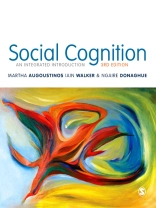The Third Edition of this much celebrated textbook continues to focus on the four major and influential perspectives in contemporary social psychology – social cognition, social identity, social representations, and discursive psychology. A foundational chapter presenting an account of these perspectives is then followed by topic-based chapters from the point of view of each perspective in turn, discussing commonalities and divergences across each of them.
Key Features of the Third Edition:
– Now includes coverage of the social neuroscience paradigm and research on implicit social cognition
– Updated pedagogical features and visual material
– An extended conclusion covers the ways in which the different approaches of the field intersect as well as a general discussion of the direction in which the field is moving.
Social Cognition: An Integrated Introduction is an integrative, holistic textbook that will enhance the reader′s understanding of social cognition and of each of the topical issues considered. It remains a key textbook for psychology students, particularly those on courses in social psychology and social cognition.
Inhaltsverzeichnis
Chapter 1: Introduction
Defining social psychology
The crisis in social psychology
Social cognition
Aims of this book
Organization of this book
Concluding comments
PART I
Chapter 2: Theoretical Foundations
Introduction to social cognition models
Introduction to social identity theory
Introduction to social representations theory
Introduction to discursive psychology
A post-cognitive psychology?
PART II
Chapter 3: Social Perception
Social cognition and social perception
Social identity theory and social perception
Social representations and social perception
Discursive psychology and social perception
Chapter 4: Attitudes
What is an attitude?
Social cognitive approaches to attitudes
Attitudes and social identities
Attitudes and social representations
Discursive psychology and attitudes
Chapter 5: Attributions
Social cognition and attribution
Social identity and attributions
Social representations and attributions
Discursive social psychology and attributions
Chapter 6: Self and Identity
Social-cognitive approaches to self and identity
Functions of the self
Social identity approaches to self and identity
Social representations approaches to self and identity
Discursive approaches to self and identity
Chapter 7: Prejudice
Social cognition and prejudice
Social identity and prejudice
Social representations and prejudice
Discursive psychology and prejudice
Chapter 8: Ideology
Social cognition and ideology
Social identity and ideology
Social representations and ideology
Discursive psychology and ideology
PART III
Chapter 9: Conclusion
The individual and society
Levels of analysis
Realist vs constructivist epistemologies
Social change
Über den Autor
Ngaire Donaghue is an Associate Professor of Social Psychology at Murdoch University in Western Australia.












